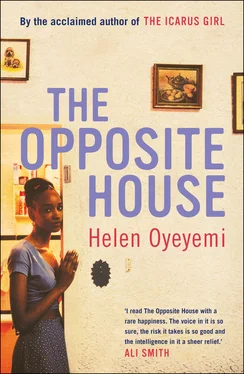Helen Oyeyemi - The Opposite House
Здесь есть возможность читать онлайн «Helen Oyeyemi - The Opposite House» весь текст электронной книги совершенно бесплатно (целиком полную версию без сокращений). В некоторых случаях можно слушать аудио, скачать через торрент в формате fb2 и присутствует краткое содержание. Год выпуска: 2008, Издательство: Bloomsbury UK, Жанр: Современная проза, на английском языке. Описание произведения, (предисловие) а так же отзывы посетителей доступны на портале библиотеки ЛибКат.
- Название:The Opposite House
- Автор:
- Издательство:Bloomsbury UK
- Жанр:
- Год:2008
- ISBN:нет данных
- Рейтинг книги:4 / 5. Голосов: 1
-
Избранное:Добавить в избранное
- Отзывы:
-
Ваша оценка:
- 80
- 1
- 2
- 3
- 4
- 5
The Opposite House: краткое содержание, описание и аннотация
Предлагаем к чтению аннотацию, описание, краткое содержание или предисловие (зависит от того, что написал сам автор книги «The Opposite House»). Если вы не нашли необходимую информацию о книге — напишите в комментариях, мы постараемся отыскать её.
The Opposite House — читать онлайн бесплатно полную книгу (весь текст) целиком
Ниже представлен текст книги, разбитый по страницам. Система сохранения места последней прочитанной страницы, позволяет с удобством читать онлайн бесплатно книгу «The Opposite House», без необходимости каждый раз заново искать на чём Вы остановились. Поставьте закладку, и сможете в любой момент перейти на страницу, на которой закончили чтение.
Интервал:
Закладка:
‘So what if your English is bad?’ I said. ‘I’ll talk to them.’
Mami kissed my forehead, her arms dropped down around me; I stiffened because she was laughing and crying at once and I didn’t know what it meant. Her hands clasped around my throat, and when I looked into her eyes I couldn’t find her. Instead I saw something inky and strange rising. I said, ‘Mami?’
She was hurting me.
‘Usted es una hija mala,’ she said. She sounded angry, but her eyes were shiny with hurt. ‘Cómo se atréve a contradecirme?.’
‘Mami,’ I said, and I tried but my fingers couldn’t unlock her iron ones. My vision took on black edges, and I began to believe that she was going to kill me; she was saying that I was a bad daughter and I didn’t know why.
She let go of me; I fell down, and that was when I first learnt that I needed to protect my throat, my voice, because that was where my hands went first, to the circling pain. I croaked, and I vomited hard. Chabella said she was sorry. She said it just once, she said it very softly, and then she got up and walked halfway across the room and came back to me with her eyes swimming and glowing so that I cowered and thought she was so sad because I was going to have to die. But then she walked away again, came back, walked away from me with her face pulled mask-tight until finally she came back for good and snatched me up into her arms and kissed me and hugged me. It wasn’t enough; I was still afraid.
I need words from Chabella. It has maybe been that way since the first time I understood that she didn’t already know what I was thinking. I was three; a friend had made me cry. Mami picked me up and asked me, ‘What’s the matter, what?’ Papi had rushed to pick me up too, but Mami got there first. Papi says that when she asked I was so surprised that I knocked my forehead against hers in my haste to get a proper look into her eyes. I don’t remember, but apparently I said, ‘I have to tell you?’
Miss Lassiter’s telephone rings and rings, on and off, all afternoon long.
Kneeling by the sitting-room table, I write cheques for bills with my eyes three-quarters closed so I don’t see how I’m decimating my bank account. Then I sit in the kitchen with my rosary wrapped around the hand that isn’t trying to finish fitting lyrics to a song, beating the rosary hand against the table in abbreviated rhythms that aren’t helping.
Magalys calls to ask me if I want to have coffee with her. I want her to have forgotten my Cuba, or at least dimmed it amidst the train of other memories. I wonder if she’ll show me what I would have been like had we stayed in Habana. She and her brother teach dance classes near Bond Street, and I can meet her at the studio because she’ll be finished with her last class by the time I get there. It sounds as if at least ten million people are tap-dancing behind her, but her voice is very calm.
Tomás has got awkward digestion. His condition is called reflux. What happens is he eats something, waits half an hour, and, no matter how carefully he has chewed his food, he vomits. Even when he was nursing, he used to dribble milk hours after having fed. I observed all this with deep interest, the return of Tomás’s food without invitation. Mami took him to the doctor, but the doctor said that as long as the reflux didn’t happen while he was sleeping, it was OK. And it never did happen while he was sleeping. When he was smaller Tomás didn’t used to think about it; he’d just go and vomit and then get on with whatever he was doing. He ate extra at meals in anticipation of the amount that he was going to lose. At fourteen I knew about bulimia; I’d read books with titles like When it’s Hard to Eat . Tomás’s vomiting like that wasn’t good, but it couldn’t be that bad because he didn’t do it on purpose.
One day Papi noticed what Tomás was doing.
Papi put down his newspaper, put on his slippers and followed Tomás upstairs. I followed Papi. The two of us watched Tomás lean over the sink and spit up his lunch, then thoroughly and unselfconsciously rinse out his mouth and dab his face with a face towel, the way Mami had taught him. Tomás was five. I looked at Papi to see what he thought; Papi’s mouth was wide open, his eyes were narrowed behind his reading glasses. Tomás turned, said, ‘What is it?’ to both of us, and tried to get past, but Papi clamped his hands on Tomás’s shoulders and knelt down so as to be small with him.
‘You do that every day?’
Tomás said, incredulous, ‘What?’
‘It happens two or three times a day,’ I interjected, surprised.
Papi didn’t look at me. ‘Stop that, Tomás. Do you hear me? Do you see me doing that kind of thing? It’s unheard of. Boys don’t do that.’
‘Papi, girls don’t do it either, though. Mami doesn’t do it. Maja doesn’t do it. Just me does it,’ Tomás argued.
Papi straightened up and looked down at Tomás. All he said was, ‘Don’t test me.’ He went downstairs, back to his newspaper. Tomás came and took my hand, and gave me a look full of surprise. ‘It’s OK?’ he said. He meant everything. Papi, vomiting, everything.
‘It’s OK,’ I said, gently putting his other hand back down to his side — Mami didn’t want him sucking his thumb because that was how people got buck teeth.
After that, Chabella and I watched Papi watching Tomás.
We all got to know the signs of Tomás’s regurgitation, the way his cheeks expanded, the way he’d get a dizzy, gassed look from trying to hold it in. Then, when we couldn’t bear to sit around watching Tomás hold sour food in his mouth any more, Papi let Tomás scramble up the stairs to the bathroom. To Mami, Papi said, ‘Why is this happening to my son?’
Chabella said, ‘El crecerá fuera de ello , Juan, he’ll grow out of it. He’s so small now. And he’s the London baby.’
There was a thing that happened that I didn’t tell Papi. My Spanish teacher wrote lots of letters for Amnesty International and thought that I should take more of an interest in Cuba. Miss Roberts was no more Spanish than I was, but we always had to call her Señora Roberts, to sustain the mood of the language lesson. After one lesson she leant on the edge of my desk and asked me, ‘You know what gusano means, don’t you?’
I glanced at the door to make my intentions clear and I said, ‘Yeah, it means “worm”.’
She said, ‘That’s what they call anti-revolutionaries and other dissidents in Cuba. It’s actually a key term in Fidel’s political vocabulary. Gusano . Or if not that then you’re the son of a gusano . It’s a terrible thing, isn’t it, using language to take away the humanity of someone who opposes you?’
I said, ‘Yeah.’ I fidgeted with my bag strap; I didn’t like the way Señora Roberts had said ‘Cuba’ so softly, as if she were trying to rein in the towering force of it, as if she expected me to gasp or something. I didn’t like the way she was looking at me, eyebrows raised, lips quirked; she was looking at me as if we shared something, as if she knew me much better than she did.
I knew that Señora Roberts was thinking that my father must have told me all about being gusano , what it was like to have your colleagues begin to denounce you to avoid the label themselves. She thought that as she spoke a painful reel was playing behind my eyes, a sequence in which someone wearing a Cuban flag for a bandana spits in my father’s face and shouts, ‘Gusano!’ Then, perhaps, the same man kicks Papi’s legs out from under him and stamps on his ribcage. But that is not the story. If Papi says ‘gusano’ , he doesn’t let the word or its meaning come near him. Papi sits silent and bespectacled behind Cuban broadsheets, then he throws them away and says little about them.
Читать дальшеИнтервал:
Закладка:
Похожие книги на «The Opposite House»
Представляем Вашему вниманию похожие книги на «The Opposite House» списком для выбора. Мы отобрали схожую по названию и смыслу литературу в надежде предоставить читателям больше вариантов отыскать новые, интересные, ещё непрочитанные произведения.
Обсуждение, отзывы о книге «The Opposite House» и просто собственные мнения читателей. Оставьте ваши комментарии, напишите, что Вы думаете о произведении, его смысле или главных героях. Укажите что конкретно понравилось, а что нет, и почему Вы так считаете.












